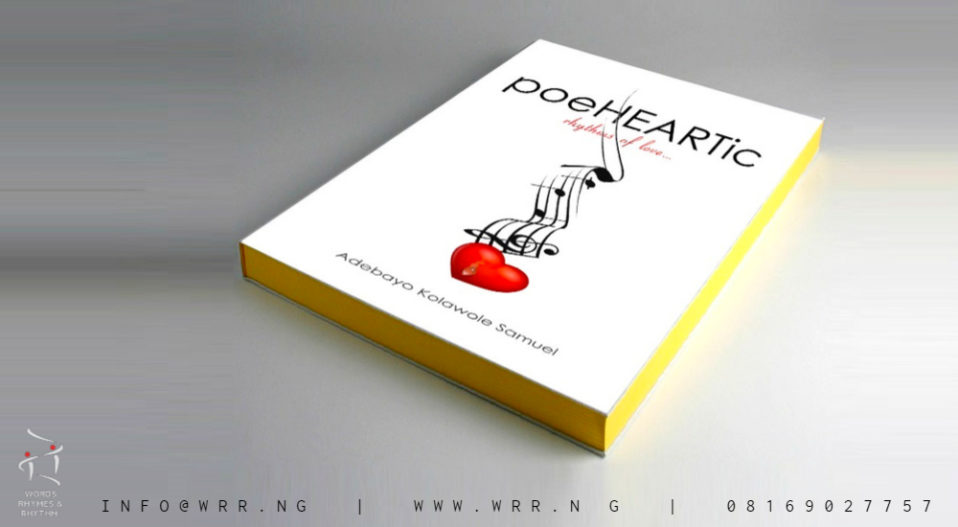Title: Poeheartic (Rhythms of Love)
Author: Adebayo Kolawole Samuel
Genre: Poetry
Number of Pages: 70
Publishers: Words Rhymes & Rhythm
Year of Publication: 2017
ISBN: 978-978-959-183-1
Reviewer: EUGENE YAKUBU
Hidden behind this somewhat unpromising title are superb verses creatively formed in literary aesthetics and figurative grandeur. This collection of poetry is characterized by a genuine and spontaneous creativity whereby the reader practically feels the poet’s natural voice talking to him through the pages of the collection.
The realness in theme, the natural settings, and the familiar paths of love which we have all one time or the other threaded on is what the poet recreated in this collection; hence the nostalgic feelings the verses induce in readers.
When I pick up Poeheartic (Rhythms of Love), I am instantly revisited by a sensory memory: I am threading home, rustling leaves littering the ground crunching under my innocent foot. I smell the smoke of fireplaces and think about that fragile feeling tingling me with a wide grin spread across my face as I recall her stunning face and lovely breath in my heart.
This familiar feeling— love and passion is what Adebayo Kolawole Samuel beautifully recreated in his readers as they feed on his emotional verses. His love chants are peculiar for their onomatopoeic diction.
In the collection Poeheartic (Rhythms of Love) the poet carefully selects words that seem to echo resoundingly into the soul. He uses words whose sounds seem to duplicate the sound it denotes— an amazing and remarkable feat whereby there is a similarity between the meaning of the word and the sensation of articulating the words through their sounds. This is a laudable effort which the poet enduringly maintained through the collection.
The poet successfully made allusions to certain Greek mythologies which he uses as symbols to convey meaning. His referencing to the legend of the Phoenix in Espresso and Revival is well articulated which shows his knowledge of classical tradition. The reference to the god of love “Cupid” is also notable in the poem Revival, whereby love, like “phoenix” is said to resurrect again from “grey ashes”, referring us back to the popular legend of regeneration of the phoenix through its burnt ashes.
The poet’s simple diction is still yet adorned in literary figures and aesthetic symbols.
There are notable similes, metaphors, rhymes, rhythms, alliterations, assonance and metonymy which all contribute in grounding the reader in the images created by the poet. The alliteration and pun in the poem Me is intriguing. Line 8 of the poem says “and he pours and pours and pores” referring to a drunk busy with his wine, still yet playing on the meaning of the words “pours” and “pores” to capture the reader’s attention while calling on his lover to “drink [him] like that!” and “fall into [his] arms/ like a drunk falling into the arms of wine”.
In the poem How to Love a Woman, the poet indulges any potential lover to “[w]alk into that city/… and … turn your ears away/ from scattered notes” for a “woman is music/ that scatters into formation”, such a daring call to win a woman’s heart which the poet amusingly teaches readers to emulate. How to Love a Man also provides helpful techniques for any lady willing to keep her man for herself. The poet’s effort is lauded for having readers relate to his personal thoughts and musings on loving and keeping a love partner.
The poem Longings 1 has a certain kind of succinct creativity about it. The poet crafted striking similes and abrupt picturesque diction which espouses the intensity of romantic passions— the muted voices of lovers and the silent verses of emotions. The poet in his signature style acclaimed “Here I am; / dead/ buried in that place/ where my lips/ have burrowed—/ inside your mouth” to achieve the maximum concentrated verbal effects within the tight limits of the closed and abrupt verse.
The poem Rhythms is crafted with a measured recurring regularity of sounds and internal rhymes in the verse lines. The poet made a conscious effort to instill musical rhythms and rhyming tones— a basic feature of a good poem. The poem is an adoration to an unnamed love object which the poet personae adorns by calling her “tall, strong, and prettily fruity” like the “palm tree” behind his grandfather’s hut.
The poet exploited all the language patterns in his collection with sublime virtuosity, a master of rhetorical figures and poetic diction.
The referencing to African locale and setting gives the poem a magical taste of nature. This is achieved by introducing objects typical of an African setting in the poem; hence the poet is conscious of his traditional environment. He infused the same traditional magic in the poem Àwèrò mi (My Àwèró) where the poet uses local Yoruba diction to capture his theme. But even so, he provided adequate glossaries to enable the reader who isn’t familiar with Yoruba diction to decipher the meaning of the words as they relate to the theme of the poem.
This collection is generally a fusion of syntactical prowess and beautifully crafted themes which the poet had little or no problem sharing with his readers. The poet is commended for his vast experiences and ideas about love and passion; his tone is also captivating and alluring, while his diction is literarily grounded and aesthetically crafted in literary figures and tropes.
This collection will create, even in the most indifferent of readers a nostalgic feeling of his passionate moments and romantic escapades. It is a recommended piece for every lover of good poetry and refined romantic verses.








You must be logged in to post a comment.